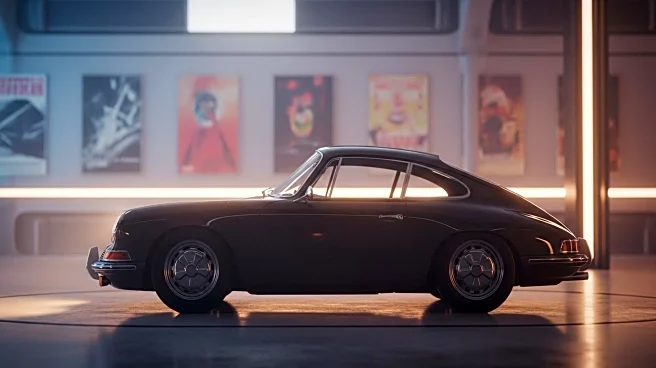What's Happening?
Porsche has announced a strategic realignment, delaying its next electric sports cars and reconfiguring its flagship SUV to run on petrol. This decision comes after years of promoting an all-electric future, with the Taycan model initially leading the charge. However, the company has found that its customers, primarily older affluent men in North America and Europe, are not ready to give up the traditional engine noise associated with Porsche's brand identity. The Taycan, despite being a technical triumph, faced high production costs and a demanding battery platform, leading to a weakened business case for further electrification. As a result, Porsche has taken a €1.8 billion write-down to restructure its program, impacting its profit forecast and share price.
Why It's Important?
This strategic shift by Porsche highlights the emotional economics of engine noise and nostalgia, which play a significant role in consumer preferences. The decision to delay electric models reflects broader challenges in the luxury EV market, where demand has softened. Porsche's move underscores the tension between traditional automotive values and the push for electrification. While the company aims to maintain profitability by catering to its loyal customer base, this approach may limit its long-term growth potential as regulations tighten and younger buyers favor electric mobility. The decision also mirrors similar adjustments by other automakers like BMW and Mercedes, indicating a cautious approach to the energy transition within the industry.
What's Next?
Porsche's decision to focus on combustion engines may provide short-term stability, but it risks alienating future generations of car buyers who are more environmentally conscious. As cities and countries implement stricter emissions regulations, the market for combustion cars is expected to shrink. Porsche may need to redefine its performance metrics to align with evolving consumer expectations and technological advancements. The company could explore new narratives around control, precision, and efficiency to engage a broader audience. However, this would require significant changes in its branding and product development strategies.
Beyond the Headlines
The deeper implications of Porsche's decision involve the sociology of innovation, where technological transitions often face resistance due to entrenched user identities. Porsche's clientele values cars as expressions of personal ability, and electric drivetrains challenge this hierarchy by democratizing power. This cultural clash between identity and technology highlights the complexities of adopting new innovations in industries with strong traditional roots. Porsche's current strategy may preserve its brand legacy temporarily, but it must eventually adapt to the changing landscape to ensure long-term sustainability.









